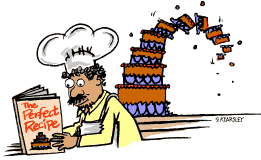 Monthly
Feature:
Monthly
Feature:

Two
of the great myths of working with food are that all recipes
are good, and that flops are usually the fault of the cook.
So for many, it's a relief to learn that recipes often fail
for reasons that have little to do with cooking skills. Let's
look at several factors that help guarantee success in the
kitchen.
A good recipe is balanced.
In cakes, cookies, muffins, and pastry, the best recipes are
cleverly designed so ingredients that tenderize don't overpower
those that create structure. When a cake flops, for instance,
it's sometimes because the recipe calls for too much sugar.
While appealing to one's sweet tooth is important, too much
sugar creates a batter so tender that it's too fragile to
support
the volume of the rising cake—so it falls before it sets.
And that has far less to do with your cooking expertise than
that of the recipe writer. Be aware that not all recipes are
good recipes.
Additional
information is often helpful.
Those low-fat muffins look great in the photo and the instructions
simply say to "stir the ingredients together." And
so you do. In fact, you give the batter a little extra stir
so those muffins will be even better. What the recipe
doesn't
tell you is that stirring develops gluten, which gives strength
and elasticity to batters and doughs. While these qualities
are important in doughs made with yeast, strength and elasticity
are not desirable in quick breads.
|
A
Note from the Inquisitive Cooks
It's
with great pleasure and a sense of excitement that we
are back online as invited guests in this new venture
initiated by the Exploratorium.
A
dynamic and stimulating team at the Exploratorium is
giving "accidental scientists" a fascinating,
in-depth look at cooking through the lens of science.
(And yes, many of them enjoy cooking, too!)
We
hope those of you newly intrigued by this approach to
food will enjoy this opportunity to learn "how
cooking works." And we extend a special welcome
to those who were part of our remarkable and loyal audience
over five years at inquisitivecook.com. We invite you
to once again become actively involved with your comments,
suggestions, and interesting questions. Please help
us create a new, cohesive, and lively community of cooks
online.
Explore!
Have fun! Join us often. And reap the rewards that being
inquisitive brings to cooking.
Anne
& Sue
|
Muffins
and biscuits need a tender framework that rises quickly as
baking soda and baking powder give off carbon dioxide. Stirring
is even less optimal in low-fat, low-sugar baked goods, because
both sugar and fat are tenderizers. When you reduce tenderizers,
keep structure-builders to a minimum too. In this case, stir
as little as possible after the flour is added.
Your
surroundings may affect the final product.
Recipes for meringues, for instance, made by beating egg whites
with sugar, look simple. And in fact, they go together very
easily (for an example, see
our
recipe for Pavlova
). But it also helps to know that they're
best made on dry days. Sugar dissolves into the egg whites
as you beat them. Then as sugar attracts moisture from the
air, you'll notice little beads of syrup form on the surface
of the baked meringue. If meringues sit on the counter on
a humid afternoon, or if they're stored in the damp atmosphere
of your refrigerator, they can become as sticky as the weather.
Assessing doneness? The final decision is yours.
Many factors affect baking times: The temperature of the ingredients.
Whether the pan is shiny or dull. The accuracy of your oven.
Since it's impossible to give exact baking times, a good recipe
gives a range of time. Check early. A few minutes of extra
cooking can make the difference between brownies that are
moist and those that are dry and crumbly. Or a roast that's
moist and tender, and meat that's tough and chewy, simply
because it has been overcooked (see the
"Finger
Test for Doneness"
). Keep in mind that you, the cook,
are the final judge of doneness.
So
cookbooks are wonderful, but there's much that recipes don't
tell you about cooking. Understanding how ingredients interact
and the logic behind techniques helps you cook successfully.
Once you know what makes a recipe work, you can fill in the
gaps yourself. If you are already accomplished in the kitchen,
understanding the science behind cooking is the ideal foundation
for making changes and creating new recipes. Become a better
cook with science!
|
